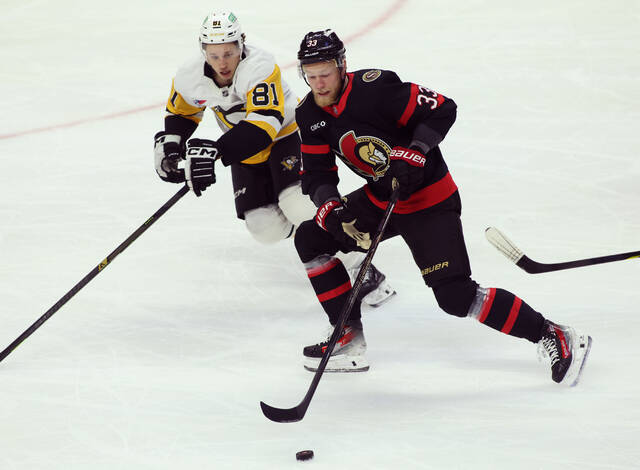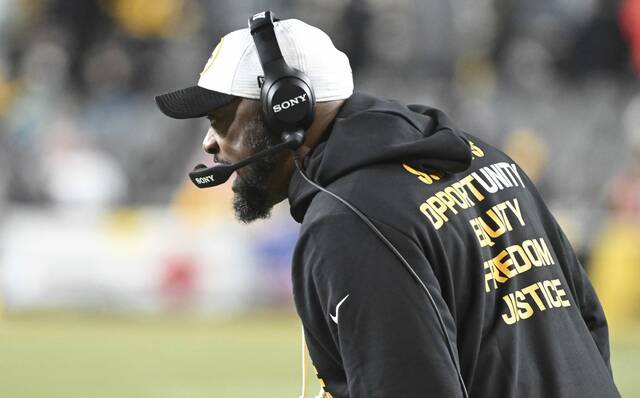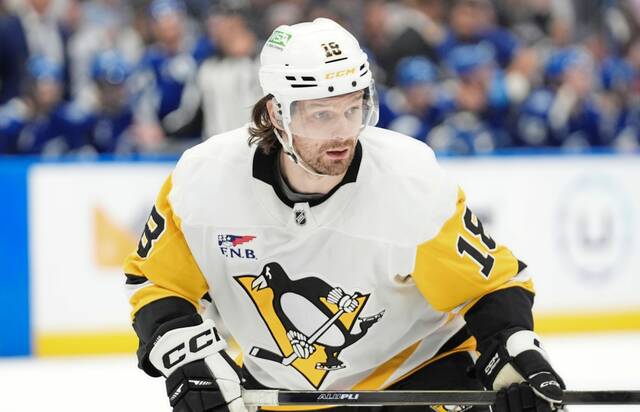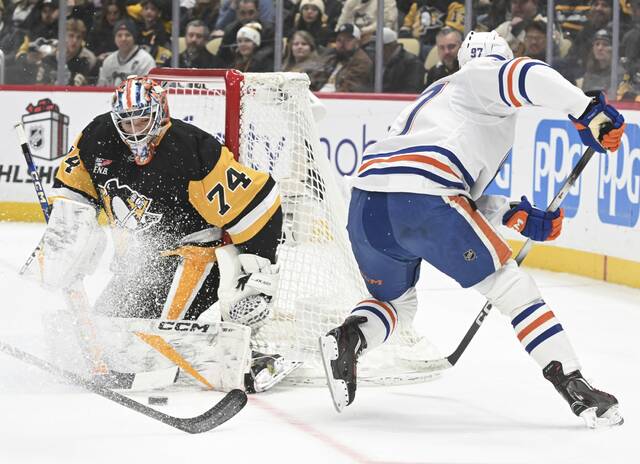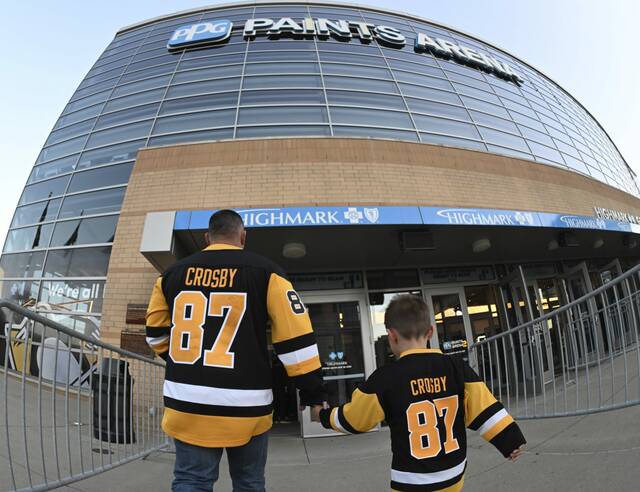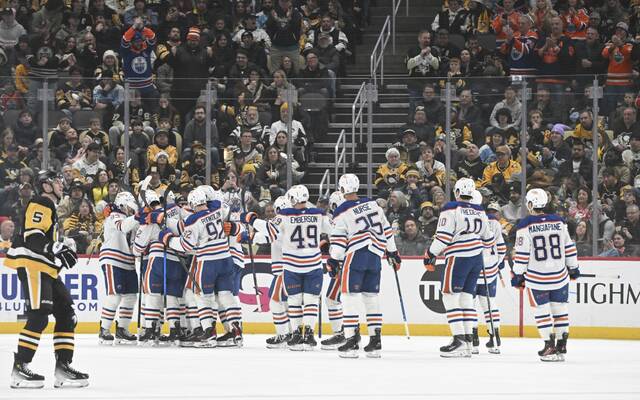While the NHL is on hold because of the ongoing coronavirus pandemic, the Tribune-Review will offer the Double Team project, an examination of the five best players who have contributed substantially to the Penguins and another franchise. For consideration, a player must have played at least the equivalent of a full season for each franchise. (Sorry, Jarome Iginla fans.)
Today, a look at the Boston Bruins, who entered the NHL in 1924, 43 years before the Penguins. As one of the NHL’s so-called “original six” franchises, the Bruins raised a fuss when the Penguins changed from their primary color of blue to a black and yellow scheme in 1980 but those protests fell on deaf ears. On the ice, the Bruins have had a clear advantage over the Penguins. In 210 games against the Bruins, the Penguins have a 73-110-27 record.
1. Mark Recchi, right winger
As an undersized fourth-round draft pick in 1988, Recchi didn’t beat the odds by simply reaching the NHL. He thrived at the sport’s highest level for 22 years and was ultimately enshrined into the Hockey Hall of Fame in 2017.
The first four of those seasons took place in Pittsburgh, the most notable being the 1990-91 campaign when he helped offset the absence of injured franchise icon Mario Lemieux by leading the team with 113 points (40 goals, 73 assists) in 78 games. An All-Star that season, Recchi served a prominent role in the franchise’s first Stanley Cup title that spring.
At the 1992 trade deadline, the Penguins dealt Recchi to the rival Philadelphia Flyers and he bounced between Philadelphia and the Montreal Canadiens over the next 12 years before returning to Pittsburgh an unrestricted free agent in 2004. Following the 2004-05 NHL lockout, Recchi had a productive but brief second act with the Penguins before he was moved again at the 2005 trade deadline to the Carolina Hurricanes, helping that franchise win its first Stanley Cup that spring. Barely a month after that triumph, he re-signed with the Penguins for a third stint.
After a sturdy 2006-07 season, Recchi struggled badly at the start of 2007-08 and many wondered if he was at the end of his career, including Penguins management which put him on waivers in December of 2007. Recchi rebuilt his game during brief tenures as a member of the Atlanta Thrashers and Tampa Bay Lightning before being moved again to the Boston Bruins at the 2009 trade deadline.
With Boston, Recchi put together a marvelous final act, primarily as a second-line winger, and was a vital component of the 2011 Stanley Cup championship, that franchise’s first in 39 years, before retiring.
2. Phil Kessel, right winger
Several years before he was vilified in Toronto, Kessel was an outcast in Boston.
But he was a sympathetic figure early during his time with the Bruins. The fifth overall pick of the 2006 draft, his rookie campaign of 2006-07 was interrupted by a bout of testicular cancer. His ability to overcome that considerable challenge earned him the Bill Masterton Memorial Trophy, which recognizes perseverance and dedication to the sport.
Kessel finally began to realize his potential in 2007-08 when he broke through with 36 goals and 60 points in 70 games.
And after a productive two-round run in the postseason, Kessel seemed poised to establish himself as the Bruins’ next great player. But a contract dispute forced the Bruins to deal him to the Maple Leafs during the 2009 preseason.
After six prolific but unsatisfying seasons with the Maple Leafs, Kessel was moved again by the summer of 2015 when the Penguins acquired him via trade. In Pittsburgh, Kessel enjoyed his greatest success as a two-time Stanley Cup champion in 2016 and 2017, with much of that time being spent on the vaunted HBK Line along with Carl Hagelin and Nick Bonino.
While he produced more than a point per game in 2016-17 and 2018-19, Kessel’s fortunes fizzled out in each of those postseasons and he was on the move again, dealt to the Arizona Coyotes in June of 2019.
3. Dean Prentice, left winger
Truth be told, Prentice is far more renowned for his time with the New York Rangers as an All-Star throughout the 1950s and early 1960s than with any other franchise. But that shouldn’t dismiss his mostly effective play as a member of the Bruins and Penguins.
The Rangers dealt Prentice to the Bruins in February of 1963. In Boston, Prentice was selected for the 1963 All-Star Game (which was held before the 1963-64 season), served as a sturdy defensive winger for the Bruins and even produced a 23-goal season in 1963-64.
After suffering a broken back — during a sequence in which he was tripped then scored on the ensuing penalty shot — in December of 1964, Prentice was traded to the Detroit Red Wings in February of 1966. Following some solid but hardly notable seasons in Detroit, Prentice claimed by the Penguins through an intra-league draft in June of 1969.
With the Penguins, Prentice enjoyed a late-career renaissance in his late 30s. In 1969-70, he led the team with 51 points — including a then franchise-record 26 goals — in 75 games and was selected to another All-Star Game, becoming the first Penguins player to score a goal in that contest. He also helped the franchise reach the postseason for the first time that spring.
In 1970-71, Prentice scored 21 goals and 38 points in 69 games. By October of 1971, he was traded to the Minnesota North Stars.
4. Andrew Ference, defenseman
Ference was something of a rarity during his time with the Penguins in the late 1990s and early 2000s. He was one of the relatively few players they drafted and developed themselves.
As an eighth-round pick in 1997, made his NHL debut in 1999-2000 with a team mostly compiled of castoffs from other organizations. For a variety of reasons, the Penguins, under general manager Craig Patrick, just didn’t generate homegrown talent at a high rate during that era.
Ference truly established himself during the Penguins’ memorable 2001 playoff run when, as a 21-year-old, he served as their top defenseman, averaging 20:22 of ice time per game, most among the blue liners.
In 2001-02, he opened the season at the NHL level and played 75 games but struggled with a sports hernia and registered only 11 points (four goals, seven assists) for a team that began to rebuild after dealing away star forward Jaromir Jagr. Part of that rebuilding involved dealing Ference to the Calgary Flames by February of 2003.
Four years later, he was traded to Boston, where he enjoyed his greatest success as an NHLer. Within the confines of coach Claude Julien’s structured defense, Ference thrived as a second-pairing blue liner. In 2010-11, Ference was a key contributor to the Bruins’ Stanley Cup championship and helped them reach the final once again in 2013.
After seven seasons with the Bruins, he joined his hometown Edmonton Oilers as a free agent in 2013.
5. Hal Gill, defenseman
Gill’s career can really be split in half — before and after the 2004-05 NHL lockout.
Prior to the work stoppage, the NHL was a big man’s territory full of plodding, oafish defensemen who were permitted, through lackluster enforcement of the rules, to hook, hold and generally impede faster, skilled players. There were few players in the NHL who thrived in that environment better than the 6-foot-7 Gill who routinely drew assignments against the likes of Jagr and Flyers star forward Eric Lindros.
An eighth-round pick in 1993, Gill spent the first eight years of his career in Boston and played in an impressive 626 career games for several playoff-caliber Bruins teams.
But after the lockout, new rules were implemented to make the game more excited (i.e. faster). As other aircraft carrier-sized defensemen were largely weeded out of the game, Gill adjusted his game, dropped weight and lasted another nine seasons in the league. A free agent signing with Maple Leafs in 2006, Gill joined the Penguins at the 2008 trade deadline and in parts of two seasons, he helped the Penguins play for the Stanley Cup twice.
After falling short against the Red Wings in 2008, Gill formed a shutdown second pairing with Rob Scuderi and that duo played a major role in the franchise’s third Stanley Cup title in 2009.
Following that success, Gill joined the Montreal Canadiens as a free agent.
Honorable mention: Leo Boivin, defenseman; Bill Guerin, right winger; Randy Hillier, defenseman; Ron Schock, center; Bob Woytowich, defenseman.



